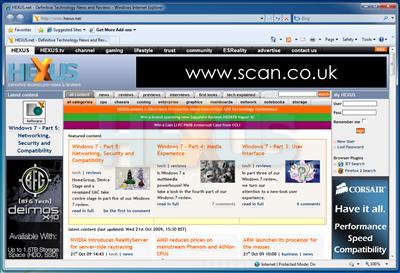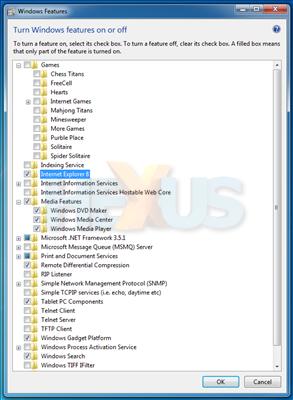What's in the bundle?
For the everyday home user, the fun to be had with a Microsoft Windows operating system can be dependent on the assortment of bundled applications. There are always games such as Solitaire and Minesweeper to fall back on, but what else does each generation of Windows add to the mix?
Aside from previously discussed revisions of Windows Media Player and Windows Media Center, another upgrade is the latest version of Microsoft's web browser - Internet Explorer 8. Despite almost failing to make its way into the hands of European users as a result of ongoing scrutiny from the European Commission, Internet Explorer 8 (IE8) does make the cut and it's a useful upgrade when compared to its predecessor, Internet Explorer 7.
The browser's key features, according to Microsoft, are improved security, with IE8 promising to block two-to-four times more malware attacks than other browsers; Accelerators, a new tool designed to simplify common tasks such as emailing or sharing; Web Slices, a feature that vows to make information from supported sites available throughout the browsing experience; and Visual Search Suggestions, providing real-time search from sites such as Amazon and Wikipedia.
Improved security is always welcome, and though Accelerators and Web Slices aren't quite catching on, IE8's most useful upgrade comes in terms of speed and performance. In keeping with Windows 7 as a whole, IE8 is quicker at performing everyday tasks such as loading new tabs - and it's a marked improvement when compared to IE7.
Yet, despite being adequate for the average user, there's no denying that IE8 isn't as quick or as flexible as the competition - Google Chrome and Mozilla FireFox, for example, are significantly ahead. It's worth noting, also, that IE8 isn't an application exclusive to Windows 7 - it's available as a free upgrade for users of Windows XP or Windows Vista, as well.
What is new to Windows 7, however, is the improved ability to select which Windows features you want turned on or off. Those hankering to do away with IE8 will be happy to hear that Windows 7 is the first Windows operating system to allow for Microsoft's browser to be completely turned off.
Completely turned off might be too strong a statement, though. By turning IE8 off, Microsoft states that "the program won't appear to be installed on your computer and you won't be able to open it. However, the essential Internet support pieces will remain on your computer, so programs that use its HTML rendering engine to display information should continue to work."
Makes perfect sense, and those wanting to switch to an alternative browser should find that deactivating IE8 makes it a smoother transition.




